MARDUK’s Morgan Håkansson - “People Like To Complain, We're Used To That”
September 16, 2023, a year ago
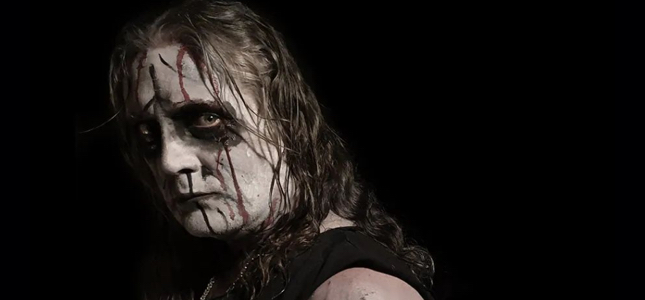
Dinkelsbühl and its architecture are world famous for one unique reason. It survived a war. World War II, as the Germans were trying to take over the world. And the reason? Trains. The are no rail lines close to the German city, so the near 12,000 population city was virtually left untouched by the demons of war. So why I did I see a Swedish freight train all in black, madly rumbling toward us while attending Germany’s Summer Breeze Air festival recently? It was the beastly and ghastly Marduk on stage, spreading it’s wrath to near 50,000 faithful. Witnessing the band live is akin to a scene in the Exorcist or the Omen. It’s invigorating and terrifying at the same time. Before the show sitting in the artist area, original Marduk guitarist Morgan Håkansson was gracious enough to lend a hand to the BraveWords Museum, autographing our extensive collection during our chat before they crushed the craniums of their black metal unfaithful. The Swedes are currently supporting their 15th studio album, Memento Mori, out now via Century Media Records. But back to collecting, kids, as he holds, coincidentally, the Fuck Me Jesus EP (a nod to the aforementioned famous film The Exorcist) and officially the band’s first demo.
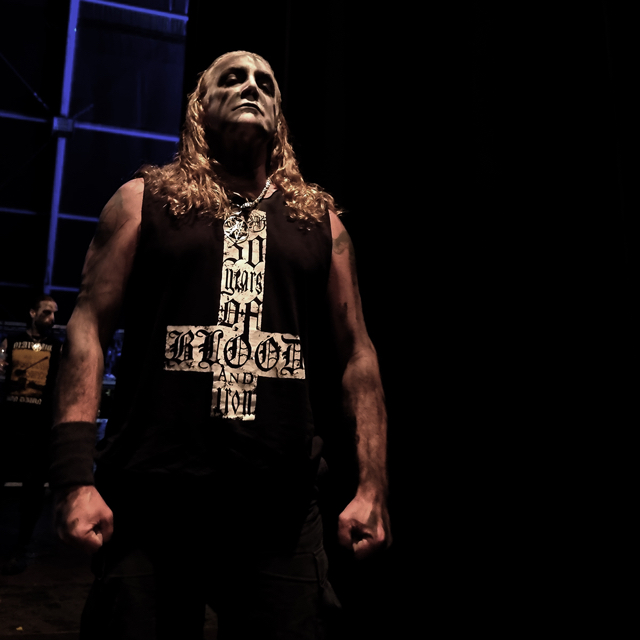
“I miss these old promo CDs,” Håkansson begins. “They are rare these days. In such good shape, too. We got a person to do an action figure of this. I have the photos, I'll see if I have it on my telephone. I have the prototypes of it."
BraveWords: And what countries banned this thing?
Håkansson: "Today, I don't think any country would. I don't think it is that offensive. People like to complain. We're used to that."
BraveWords: So, how have you adapted to the new digital world, and not this?
Håkansson: "I haven't. I haven't."
BraveWords: Are you a collector?
Håkansson: Yes, but I still listen to, for example, when I'm in my car I use my wife's Spotify to listen to regular stuff, but still, the things I really like I still buy them on CD and vinyl."
BraveWords: Can you believe the vinyl explosion?
Håkansson: "Yeah, no I can't. I actually sold a big part of my vinyl collection in 2003."
BraveWords: Why?!
Håkansson: "I just didn't care anymore. But then I started to miss it, so I have more vinyls now that I had before. But I didn't exactly buy all the same shit I had before, I bought different shit. I like a lot of classical music, so I buy a lot of used old Deutsche Grammophon, the classical stuff? Bach?
BraveWords: The yellow label.
Håkansson: "The yellow label. I buy a lot of that stuff cheap, because maybe people don't appreciate that anymore. But boxed sets, vinyl, like twelve vinyls for thirty Euros of something like that, like you can buy a lot of interesting stuff. I have a thing for boxed sets, I love boxed sets."
BraveWords: What is your favourite boxed set, then, that you own?
Håkansson: "I like the new Danse Macabre Celtic Frost set, even though I own, I had them all on vinyl before. I bought the boxed set because it's so amazing.
BraveWords: Have you met Tom (Warrior) before?
Håkansson: "Yeah, we toured with him. I was a bit suspicious to do that because, in a way, I don't like to meet people that I highly appreciate, because it can ruin your whole picture of a band you really like."
BraveWords: Absolutely.
Håkansson: "Like, what about if you meet somebody that you really appreciated when you were a kid and you find out they are a total fucking dick idiot who doesn't care about you?"
BraveWords: You're scarred for life. I can relate.
Håkansson: "Therefore, I try to avoid meeting people who I appreciate, but I met a few of them over the years."
BraveWords: He's pretty humble.
Håkansson: "Tom is so humble. We toured in 2013 or something, with Triptykon, and maybe Kataklysm. I think it was some kind of festival tour. We did twelve shows or something, and I spoke so much to him about a lot of different things. Technology, World War Two, the rocket science stuff, those things, he's so crazy into all these things. So, he has many faces. I appreciate him a lot, he's a fantastic man. I was listening to some of this latest stuff just the other day when we were driving, and I was speaking to our old bass player about all the things that Celtic Frost always did, because they never cared what anybody thought, they always did what they wanted to do. I was listening to Into The Pandemonium, that's such a weird album to come out after To Mega Therion, so progressive."
BraveWords: “Mexican Radio”.
Håkansson: "He told me the whole story about ‘Mexican Radio’, because it's a Wall Of Voodoo cover. I never heard the original song until I heard it afterwards. But I actually got into Wall Of Voodoo years ago, I listened to that Far Side Of Crazy - what's the album called? Seven Days in Sammystown. They've got some really good stuff. I listened to the vocalist, he had his solo project, they did a song called ‘Camouflage’, I think, in the early ‘90s which is really good as well. But he told me the story where they recorded ‘Mexican Radio’, and it was not intended to be on the album, but they needed a new version and it turned out and then they decided to open with that one. It's a weird song, but it's catchy, it's good."
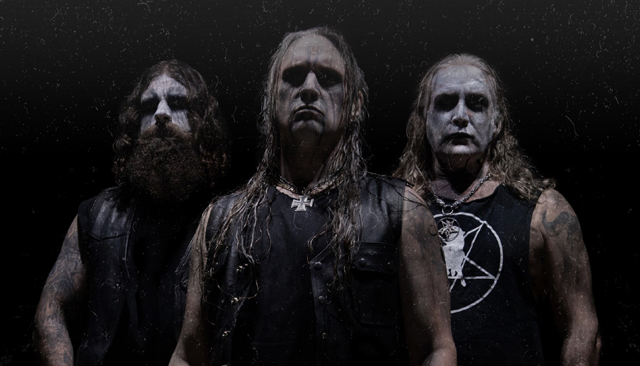
BraveWords: Do you remember your first vinyl purchase?
Håkansson: "I think I got it from my uncle, I think it was KISS, The Elder, that I owned myself."
BraveWords: What bands from the ‘70s really influenced you, then?
Håkansson: "It's hard to say 'influenced me', but I like a lot of them. I like a lot of Uriah Heep stuff. I also like (Deep) Purple, Rainbow, and the old (Black) Sabbath, and a lot of other things, as well. I can't think of others to say, but so many things from every area, from the ‘70s, from the ‘80s, from the ‘90s, everything has its charm."
BraveWords: Who's your rock god?
Håkansson: "Ritchie Blackmore."
BraveWords: Really.
Håkansson: "He has everything a musician should have - perfect musician, extraordinary character."
BraveWords: So, what do you think about the Renaissance stuff that he's been doing?
Håkansson: "I bought the first two albums, it's not my favourite thing, but he does what he wants to do. He's seen life, and he can do whatever he wants to do, and that's what he loves to do, so why not?"
BraveWords: But as a guitar player, do you pay attention to how he plays guitar?
Håkansson: "Yeah, since I was young, he was one of the first, I loved him, and to copy him, and Yngwie Malmsteen as well. Ritchie Blackmore has the unique rock style, combined early on with the early classical thing he was playing. He was one of the first in rock to really put a lot of classical music into it. I bought a lot of these vinyls that were also released on CD, live stuff with Deep Purple from the late 60s early 70s, I don't remember what it's called, and they do a lot of jamming. You hear a lot of the classical stuff that he puts into it. I think it's extraordinary."
BraveWords: So how do you approach new material, now?
Håkansson: "I don't know how I approach it. I don't know, I mean, you work on music, you work on lyrics, but the most important thing is to make it become a unit. The music is reflected in the lyrics, and the other way around, and even the layout is reflected in the music. Everything, whatever you do should be a combined force."
BraveWords: Jimmy Page came to town, to Toronto, within the last ten years, and in his book he said that every Led Zeppelin album started with the foundation, which was John Bonham, the drums. That was the first thing, and then everything was laid on top of that.
Håkansson: "Yeah yeah, That's why also when you work in music, I mean some people work, I mean, how is a song created? Some start with the drum idea, some start with the vocal line, sometimes you have some lyric lines and then you build from there. Every song, I think, is built in a completely different way. That's how it works."
BraveWords: Were you paying attention to the speed metal and thrash metal from Canada like Razor, Anvil, Voivod, Exciter...
Håkansson: "And Sacrifice, I love that."
BraveWords: ...and in California, the big four, right? So you were familiar with those different scenes?
Håkansson: "Yes, absolutely! Of course!"
BraveWords: Were you a tape trader?
Håkansson: "Yeah, I was a tape trader, but not a lot. When it came to thrash, I think tape trading came to me a little bit later, I was born in 1973, so my tape trading started at the end of the ‘80s, I would say. But I mean, of course you kept track, but it's kind of hard when you talk to people far younger than you today. For example, when we grew up, we had to take the train to another city to go there, because they had one box of vinyls, and you were checking out, 'Ok, what is this? It has nine inverted crosses, it must be so good', so you just bought it and checked it out, and nobody really labelled music. It was like, hard, fast, speed. And faster and harder were what you were looking for all the time. It was a magical time. I think a lot of people today miss out on the magic of music, of trying to find things. You heard a band name and you wondered how they sound, or someone will say, 'They sound like this', and then finally you got hold of some tape. Today you type it in and you have all the things in the world served to you. So people are missing out on a lot of that magic. I'm happy to have been a part of it."
BraveWords: What was the most evil band you heard first?
Håkansson: "I would have to say the Number Of The Beast album. That's a way in for a lot of people, and then they found even bigger devotion, but most people started with music to get into it. I think it's a natural reflection of being a man. That's it."
BraveWords: Where does your heart fit when it comes to religious beliefs?
Håkansson: "I do what I want to do. I do what I believe in, that's what matters to me. I don't care. In the past I tried to convince people of this and that, but I don't care, I just do what I believe in and that's the most important thing to me."
BraveWords: But there's outsiders that would look at bands like Marduk or Emperor and think it's just like evil nonsense, but it's a lot deeper than that.
Håkansson: "It is. Yeah."
BraveWords: It's like classical music which will last for hundreds of years.
Håkansson: "Classical music is really evil as well, a lot of it. If you look up the stories and how it's written, how it's arranged, I think it's really evil a lot of old classical music. It had very great depth."
BraveWords: Any particular piece of music that was that dark that...
Håkansson: "You mean classical?"
BraveWords: Classical, yeah.
Håkansson: "I mean there's too many. I like even the more light classical music. I like a lot of Time Piece music as well. I like a lot of Polish renaissance music, and I love a lot of old English classical from the time of Henry the Eighth, and a lot of German baroque music as well. Everything from Bach up to Handel, then you have Telemann and all those. It's magic music, it's music that hasn't changed. You can play music from 1572 or whatever, as long as you have a good building, a good hall, it still sounds like it probably did back then. It's timeless. It will never be affected by trends. It's stood the test of time, that's why it's so magical.
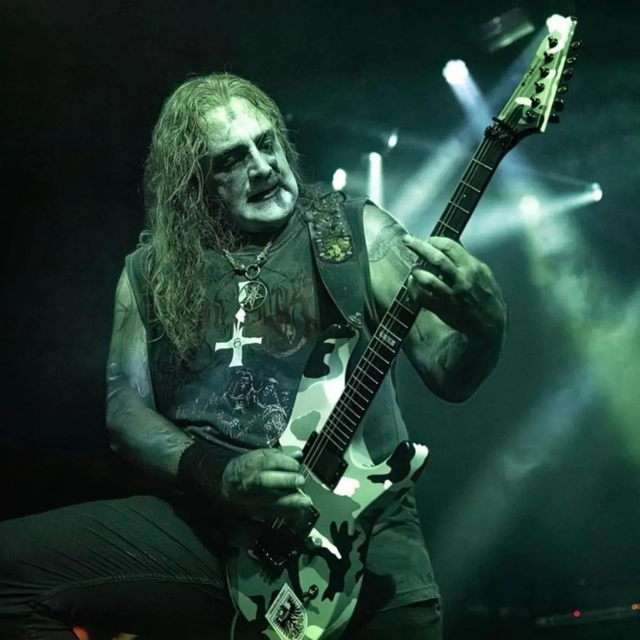
BraveWords: But think about it, a lot of those composers died fairly young, and they didn't tour, like you.
Håkansson: "No, no, but then life was also different back then."
BraveWords: Yes, of course.
Håkansson: "The rather bizarre thing was that Johann Bach's brother was a drummer in the Swedish army."
BraveWords: What's the future hold?
Håkansson: "Right now, we are doing the last summer festival for the summer. We've done 15-16 festivals. It's been a really great summer. And then after that we have a new album coming out. Then we're going to start going out and touring for the album. So, we're starting out now in September in Asia. I don't have the full schedule in mind, but I know we're doing Japan, Hong Kong, India, Taiwan, and I don't even remember. I think we might go to China depending on getting the papers in time, we shall see. And after that we'll come home for a week and a half, then we do three weeks in South America, up until early November. Then we have maybe a few Scandinavian shows November-December, and after that, if everything goes according to plan, we're gonna set sail and go over to the States."
BraveWords: And Canada, I hope.
Håkansson: "Yes, yes, of course! We don't want to miss out on that."
BraveWords: What's on the bucket list to do in your life?
Håkansson: "I don't know. I don't really care."
BraveWords: Any country?
Håkansson: "I would like to see, I mean I think I've travelled enough. I'm a guy that very much likes to be home, and be around where I live, but as I have already kind of travelled a lot. If I were to see more things, there are still some places in Europe where I would like to stay a little bit longer. I like to do a lot of historical travelling and seeing things of historical significance. To be there to see 'this happened here', you know, I like that kind of tourism. But I don't really have any bucket list. If I would die today I would feel that I travelled quite a lot and taking what I started out with as a kid in your room, and travelled quite a lot across the world, and met a lot of people who I admired when I was a kid. That's interesting.
BraveWords: Do you keep track of the countries that you're visited?
Håkansson: "Yes, yes. I started to fill it out a year ago. I think it's 72 or 73.
BraveWords: Doesn't it blow your mind what you’ve accomplished with all your catalog and touring the globe.
Håkansson: "When you get older you start to look back a bit. Before I never cared. I always looked ahead. Yes, yes, but when you pass 30 years, you look back and you think, 'Shit!', and when you meet people who weren't born when you did your first album, you're like, 'What?! I don't feel that old, but maybe someday.' And also, when I speak to some people who are far younger than me and I tell them that I saw King Diamond in 87, and they are like, ‘Man!'. Yeah, but I was, like, 14 back then and it's the same when I used to live in the city and I had a dog and I was out walking a lot and I met this older guy, who now is around 68 I think. I sort of talked to him because he's also into hard rock and a bit if metal, and he told me that he saw Rainbow in 76 and AC/DC in the 70s, saw Maiden on the Killers tour, and I'm like, 'You saw that?!'. You've got to put your age into perspective.
BraveWords: We just launched BraveWords Records, and our first signing is Paul Di'Anno.
Håkansson: "Okay! I hope it will be good. I haven't kept up to date, I read about all his problems, but I mean he has a fascinating voice."
BraveWords: We all have problems, but we're not in a wheelchair.
Håkansson: "Yeah I saw he was out doing his tour for the first time in a long, long time now. I thought he did the UK together with KK Downing. I thought, 'That can be cool'.
BraveWords: Warhorse is the band.
Håkansson: "Yeah, that can be cool, in a way. His voice has been coming and going over the years but I saw some clip and it sounded okay."
BraveWords: There's Bruce fans and there's Paul fans.
Håkansson: "I like both of them."
BraveWords: So do I. I love Bon and I love Brian. I love Sammy and I love David. I think if you're a music fan, and of course talent is talent. And good music is good music.
Håkansson: "Absolutely. But also I think it is important when you're in a band and you change vocalists you shouldn't get an exact copy of what you had before. But I mean Paul Di'Anno versus Bruce Dickinson there is also a big difference. I think that's cool."
BraveWords: When you see Maiden live, I find it interesting, because I'm a huge Maiden fan, that they play more Blaze stuff than they play Paul stuff. Because Bruce can't really sing those first two records as well. I think he has an easier time singing the Blaze stuff than the Di'Anno stuff.
Håkansson: "And it's cool that he's doing it because a lot of, I mean, Gillan would never sing any Joe Lynn Turner Deep Purple songs or something like that. And same with Sammy Hagar, and David, I mean, I don't think he would do the earlier stuff. Same with Ozzy would never sing a Dio song in Sabbath, which would have been really cool if he had done that, but it's really cool that Bruce accepts it and it's still part of Maiden's history, so why not?"
BraveWords: I would love to see the Sabbath guys go back out with Gillan and do Born Again.
Håkansson: "Someone just told me today, 'Man, Ian Gillan is 78 now', it's like, 'Shit!'. That's old. I sometimes wonder why bands continue when they're so old."
BraveWords: Is there a point where you want to draw the line?
Håkansson: "I don't know. Maybe. But if I do it, I would stop completely with music, not continue with it in any form. Do it full and then quit."
BraveWords: Have you thought about orchestrating? You see all these bands doing their material with an orchestra. Entombed did it. Obviously Metallica. Deep Purple did it.
Håkansson: "Rainbow did it back in the day. And Deep Purple was one of the first to do it."
BraveWords: There's the Black Sabbath ballet, too.
Håkansson: "Yeah. I don't think, of course it's a cool idea, but I mean it can easily become a bit too bombastic or whatever. I don't know. Everyone would want to feel so serious when they do it, I don't know. If you would do, then I would write music together with them instead of doing songs by myself, or something with the band. That would be more interesting."
BraveWords: But for you, last question, for you, you have such a classical love, it might actually work. You have the love for it and you have the vision.
Håkansson: "Yeah, it could work, but I don't know."
BraveWords: Too elitist?
Håkansson: "It's like the saying, 'Do what you do best', you know? It's the same with a lot of old bands in the past. They all did three good albums, and then they got a bit of success with the third album then they felt, 'We have to get bigger, so we have to change', so all bands did three good albums then they started to experiment just for the sake of being experimental. And a lot of bands really lost track that way. They did three, four good albums and then they wanted to reach a bigger audience or whatever, or become or realize strange ideas, which is fine. Everyone should follow their own instinct."
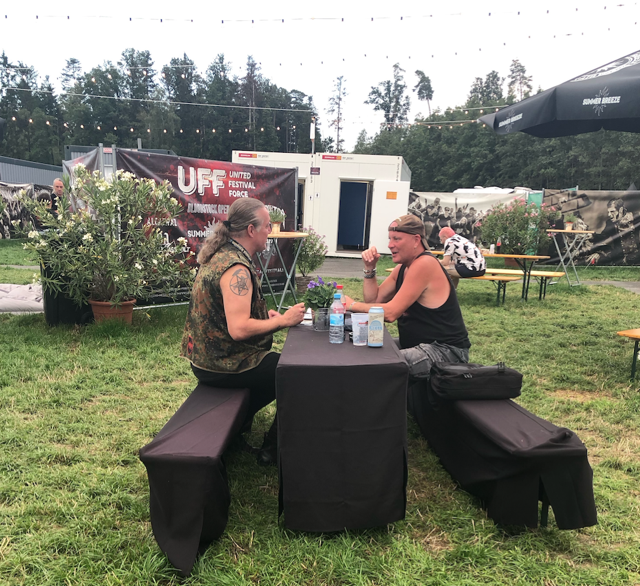
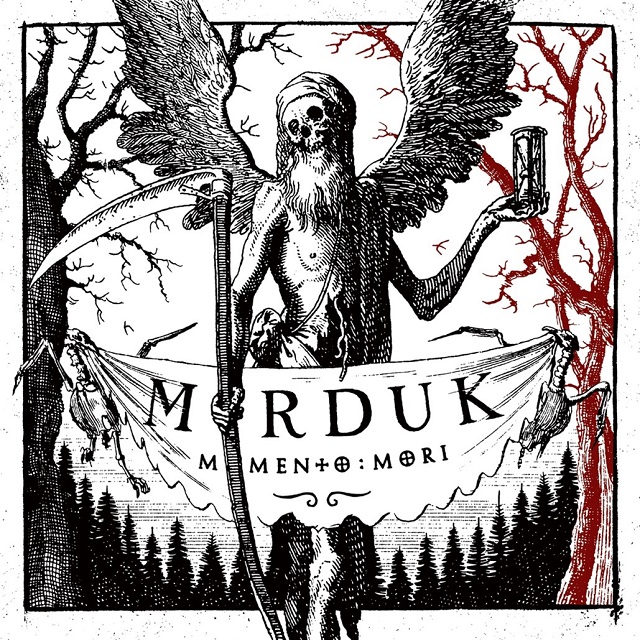
(Photos courtesy of the Marduk Facebook page)











